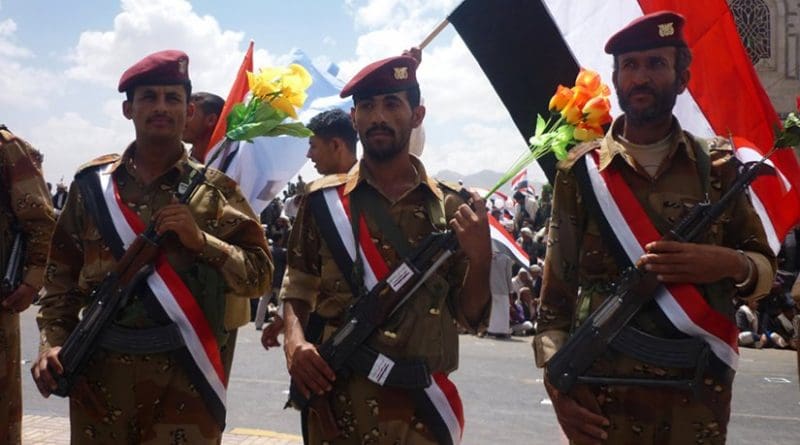Federalization Would Bring Equality To Yemen – Analysis
When UAE Minister of State for Foreign Affairs Anwar Gargash said that the Houthis need to be part of the political process, but they can’t be 3 percent of the population yet claim through the barrel of a gun to own 50 percent of the country, he was entirely correct. The future of Yemen as the Hodeidah operation continues is now front and center. Are there any immediate observations that help forecast Yemen’s future?
First, there is the requirement to understand the Houthi economic model. The Houthis see Hodeidah and its port as their major lifeline to the world. The port provides the Houthis with 40 percent of their tax revenue from throughput of goods. From the port to the delivery site, there are Houthi checkpoints collecting fees and taxes from passing trucks and vehicles. Illicit goods include arms, ammunition and military technology for armed UAVs, plus missile parts and cash.
In addition, Houthi economics include a heavy burden of taxes of anywhere between 15 and 20 percent on the public sector through salary liens, adding to the inflationary cost of everyday necessities. The Houthis also raise millions of dollars for their war effort through social media. This model is neither healthy nor sustainable and the economics of Hodeidah port is being changed in order to strangle the Houthi economy and break random taxation, which is basically extortion to support a terrorist entity. To be clear, the Houthis have developed a system of controlling key smuggling routes much like Daesh did in the Levant.
The post-Hodeidah environment means the Houthis will have to seek a survival strategy as Sanaa is squeezed tighter and tighter. This fact means we are approaching a point where the Houthis are likely to increase their ballistic missile launches against Saudi Arabia and possibly the UAE in a sign of desperation, but also using such tactics to extract possible concessions during negotiations.
The UN-proposed peace deal based on Security Council resolution 2216 and led by UN Special Envoy to Yemen Martin Griffiths, who is shuttling between various Arabian Peninsula capitals, seeks to put in place interim security arrangements and governmental guarantees of appropriate taxation distribution in order to get rid of illegal checkpoints. Placing Hodeidah under UN control would be an important first step to a fair and balanced approach to port operations and supervision.
As the Hodeidah operation continues, France and Russia
To be sure, the geographic-based rivalries and identities need to be understood and addressed across all provinces, which each host their own mini-civil wars. This phenomenon, for lack of better words, is the Yemeni kaleidoscope of various competitive interests scrambling for power and prestige as the broken country lurches forward.
A remedy that is appearing again is that of a federal state, which would bring a level of equality to Yemen. In 2014, President Hadi introduced the idea of a federal state consisting of six regions after discussions through the national dialogue process. These areas include four in the north — Azal, Saba, Janad and Tahama — and two in the south, Aden and Hadramout. Clearly, this plan did not come to fruition, but a resurrection of the federal state scheme is likely to be adjusted to current and future realities as Yemen enters its next phase. Failure to adopt this model may lead to another fracture of the country, creating two distinct entities such as that which existed several decades ago.
Houthis who reject any type of settlement will continue to be a problem, as they are likely to shift back to mountain warfare by leaving Sanaa, which has short-term benefits for the people of northern Yemen.
It is hoped that the current campaign creates the appropriate conditions for the Houthis to recognize that their lifeline is now broken. Fighting is going to move into Yemen’s northern highlands in order to expand the security and safety zone for aid distribution and the avoidance of attacks on deliveries. Unfortunately, in the short term, the most probable scenario is the continuation of the stalemate despite advances in Yemen’s north. The Saudi-led coalition is therefore going to resort to increased kinetic operations to force the Houthis to adjust their policy and perceptions.
Overall, the larger strategic environment gives rise to the possibility that the Houthis will come to their senses and negotiate a new system of revenue, while halting their extremist and horrific behavior with the use of child soldiers and forced militia service. Before that can happen, it is likely more violence will occur as the Houthis continue their illicit fight backed by Iran.

